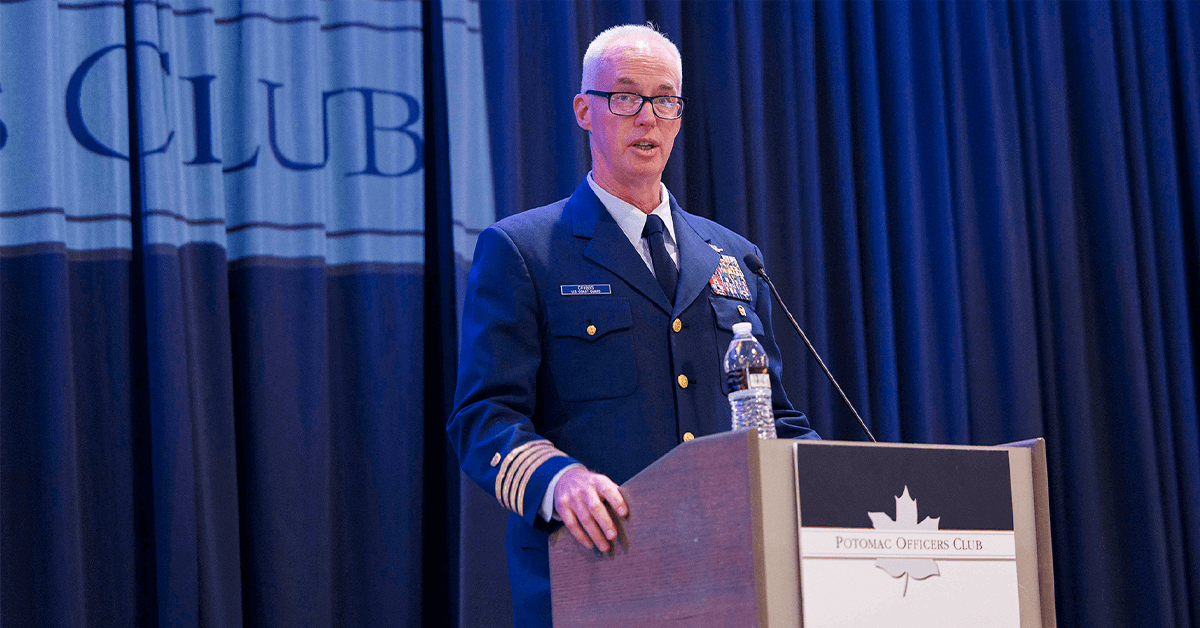Today, the cyber and physical realms are closely intertwined, with cyberattacks having the potential to disrupt critical functions across all domains. These threats pose challenges to the U.S. Coast Guard’s mission to maintain a secure maritime environment, and the organization has recognized the need to fortify its cyber defenses.
The Coast Guard Cyber Command, or CGCYBER, is responsible for addressing cyberthreats faced by the USCG, and its activities are informed by three lines of effort: defend, protect and operate.
Safeguarding the USCG’s information technology enterprise, known as the Coast Guard Enterprise Mission Platform, is the primary focus of the first line of effort.
“As you can imagine, an organization of this size, mission, people and geography requires substantial IT infrastructure to ensure mission success. We field and maintain networked computing devices, not tested in our stationary shore offices, but on our aircraft, with our boarding teams, on our large cutters and even our smallest boats,” Capt. Michael Cribbs, deputy commander of CGCYBER, said during the Potomac Officers Club’s 2024 Cyber Summit on Thursday.

These devices, he continued, “connect our frontline operators to support and resources all around the world” and offer leaders “an unprecedented view of operational assets and more decision space to facilitate better decision making.”
Cribbs noted hacktivists, skilled criminals and nation state actors as groups seeking to undermine the USCG’s IT enterprise. CGCYBER, he said, is working alongside the U.S. Cyber Command to ensure synchronization with their cyber defense priorities.
Protecting the Marine Transportation System – what Cribbs called an “an indispensable part of the U.S. economy,” – marks the second line of effort for CGCYBER.
“The existing supply chains are critical to everything from our national defense readiness to the availability of basic household food supplies,” he said.
The system, he noted, supports $5.4 trillion, or 25 percent, of the nation’s economic activity. Today, said Cribbs, hacks against the MTS are executed every 39 seconds, having an average impact of $3.86 million per hack.
Threats to the MTS, said Cribbs, are not going to go away, but will “be exacerbated by the increased reliance on internet connected, autonomous, and centrally controlled services that bring additional vulnerabilities to our network.”
He called attention to a February Executive Order that “expanded authorities with the Coast Guard to ensure the nation’s MTS is protected against malicious cyber activity.”
“The Executive Order bolsters the Coast Guard’s already robust authorities to protect the MTS from acts of terrorism and other conventional threats by explicitly addressing cyber threats,” he elaborated.
“In conjunction with the executive order, the Coast Guard signed a maritime security directive that addressed cyber risk management actions for ship to shore cranes manufactured by Chinese companies,” Cribbs added. “Also, the Coast Guard embarked in the process of developing cybersecurity regulations for facilities and vessels that the Coast Guard regulates.”
CGCYBER’s final line of effort, operating in and through cyberspace, focuses on employing cyber capabilities to support national security objectives in an increasingly complex geostrategic environment.
This pillar targets the actions of malicious cyber actors who Cribbs said “have conducted surveillance of government networks, employed malware and ransomware, propagated misinformation to steal information from organizations at risk and undermined public confidence.”
The Coast Guard’s “unique placement in the federal government” and links to the Defense Department, he continued, have postured the organization to “deliver cyber effects in and through cyberspace to counter the ability of transnational criminal organizations, hostile nation states and unaffiliated criminals to use cyberspace for illicit maritime activity.”

Interested in learning more about U.S. defense activities? The Potomac Officers Club’s 2024 Army Summit on June 13 will bring together key Army officials and industry leaders to share their insights on the service branch’s top challenges and priorities. To learn more, view the full speaker lineup and register to attend, head over to the 2024 Army Summit event page on the Potomac Officers Club website.




